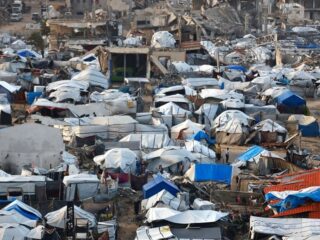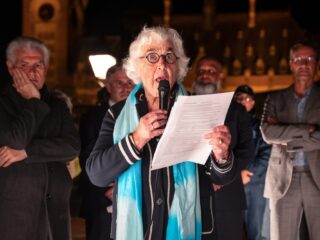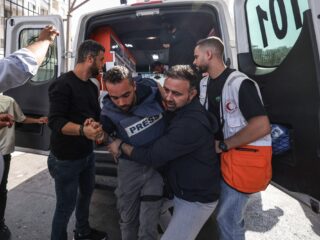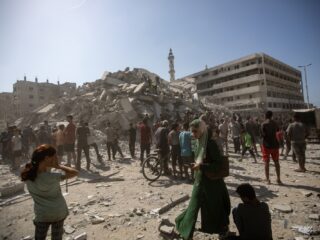Een brief uit Gaza
- Nieuws
- Een brief uit Gaza
Dagelijks worden we in het nieuws geconfronteerd met beelden van geweld, verwoesting en menselijk leed in Gaza. Hoe het is om daar te leven en hoe Palestijnen proberen hun dagelijkse leven voort te zetten, blijft vaak onderbelicht. Terwijl juist die persoonlijke verhalen inzicht geven in de impact op het dagelijks leven van de Palestijnen.
Video niet beschikbaar
In De Nacht van KRO-NCRV gaat presentatrice Elif Kan in gesprek met Spot On-redacteur Sona Boker over zo’n persoonlijk verhaal. Sona heeft al enkele weken contact met de 23-jarige geneeskundestudent Ghada Hassouna uit Gaza. Dit contact kwam tot stand nadat Ghada haar brief From Rubble to Hope: A Pediatrician’s Dream in War-Torn Gaza onder de aandacht wilde brengen. In de brief deelt ze hoe het is om in constante onzekerheid en dreiging, haar droom om kinderarts te worden voort te zetten.
From Rubble to Hope: A Pediatrician’s Dream in War-Torn Gaza
Ghada Hassouna غادة حسونة
Today, we bid farewell to Gaza—the city that the media claims will soon witness a military operation to turn it into barren land. We say goodbye to its streets that hold our memories, its mosques where we lived our happiest moments, its homes, its cafés, its places—everything. Gaza, the city that bore witness to my love for children, perhaps because I was the youngest in my family, perhaps because of the patience and calmness people always said I had. Since then, I dreamed of becoming a pediatrician—not only to help heal children but to plant within them hope, love, and life.
I always believed children never lie, that they are fertile soil ready to embrace anything. I excelled in high school, ranking second in all of Palestine, which granted me a scholarship to study medicine. I was overjoyed watching my dream slowly come true. From my earliest years in medical school, I took part in international research with doctors abroad, and I worked as a first aid trainer—because in Gaza, wars visit us every few years. I excelled in university, earning distinction in my first three basic years. Everything was going exactly as planned—until that morning.
I woke up after attending the wedding of a close friend, not knowing it would be the last wedding I would ever see in Gaza. That morning was supposed to be my very first day of clinical training at the hospital after three years of pre-clinical study. I was choosing what to wear, preparing my lunch with excitement, wondering what my first day would be like. But suddenly, the sound of massive explosions tore through my thoughts. Hours of relentless bombing followed. Soon, we learned: a new war had begun.
But this war was unlike any before—it was a war of annihilation. Within days, electricity was cut off completely—what was once six hours a day dropped to two, then to nothing, reserved only for hospitals. Imagine living for two years without cold drinking water, without a fridge, without a washing machine, without water at all—as if we had returned to the Stone Age. Food disappeared from the markets, borders were sealed shut, the bombing never stopped. Cooking gas ran out, and for months we cooked over wood fires. The shift from a life of relative comfort to one of utter deprivation rewired our very minds.
One week into the war, my uncle and his wife were killed under the rubble. A month later, my other uncle—the one closest to my heart—died of cancer because he was denied treatment and not allowed to travel abroad. We escaped death countless times. Eventually, we were forced into displacement—a word I had never fully understood until I lived it. I could not believe I was leaving my home for the unknown, heading to a tent. I, who once lived under air conditioning in comfort, now had to learn to survive in a shelter.
What should I take with me? I thought first of my iPad, holding years of my notes. But what about my books, my dreams, my clothes, my memories? A single bag could not carry it all. I packed my official documents, my phone, my iPad, a little clothing, some money, and my cat. As I prepared to leave, I noticed a box of letters from my school friends. Something told me I might never return, so I took it with me as a memory. I gave one last look at my home, tears streaming down, and walked away.
We fled under fire, alongside my grandparents in wheelchairs, whom we had to push on foot because no transport was safe. We eventually shared a tent with another displaced family—an older brother, his sister, and her four children. They became our companions, making the harshness of displacement a little more bearable.
But even amidst the chaos, I asked myself: Where is Ghada, the future pediatrician, in all this? I decided, despite the closure of universities, that I would not let my dream die. I began volunteering at the hospital’s emergency department, using my first aid and basic medical skills. For the first time since the war began, I felt myself again. I treated countless burned children, many with third-degree burns. The scenes were unbearable: the chaos of the ER, the cries of mothers, the smell of blood everywhere. I witnessed death daily, saw classmates who had once sat beside me in lectures now lying in shrouds. Professors and fellow medical students were killed; others were pulled out from under the rubble, their dreams buried with them. These were not numbers—each one had a story.
Six months into the war, after endless loss, we returned to our studies. With classrooms destroyed and hospitals overflowing with displaced families, we took our lectures sitting on the floor. Medical students in Gaza worked like residents; residents worked like fellows; fellows worked like consultants. Everyone did more than their part, sometimes for over 24 hours straight. With no internet and few resources, we shared textbooks and notes to keep learning. Against all odds, I finished my fourth year with distinction.
I entered my fifth year with hope, excited to finally study pediatrics—the department I had always dreamed of. But hope was shattered again. The ceasefire failed, the war dragged on, our home was bombed and destroyed along with every memory it held. Friends I had shared displacement with were killed.
The famine struck next. Hunger spared no one—rich or poor, young or old. Markets held nothing but lentils. My elderly grandmothers suffered, falling into diabetic comas. Malnutrition spread, diseases flourished, and antibiotics failed. I watched once-healthy young men lose more than 30 kilos, faint from hunger, some even die of starvation—a term I had never imagined could exist in modern times.
Still, I persevered. I trained in obstetrics, assisting in cesarean and natural deliveries, most of them complicated. Many pregnancies ended in miscarriage; many infants were born deformed—consequences of malnutrition and chemical exposure from the relentless bombardment.
And finally, I reached pediatrics. I stood in the ER, heartbroken, treating children suffering severe malnutrition, gastroenteritis, and dehydration. Mothers could not breastfeed; there was no infant formula. Yet amidst it all, I tried to comfort them, to bring hope. International medical delegations came and were stunned by our resilience. One doctor told me: “I expected to find you exhausted. But in truth, it is we who draw strength from you.”
The first child I carried into Gaza’s emergency room was almost three years old, yet he felt as light as a feather in my arms. His head rested limply on my shoulder, his eyes too tired to cry. His mother held onto my coat, her face pale with fear, whispering over and over ‘Please don’t let him die.’ Around us, the room was filled with the screams of other children, the smell of blood, the echoes of war. In that moment, I understood that my dream of becoming a pediatrician was more than a career- it was a promise to stand besides children when the world had abandoned them.
Even as I worked, I never stopped dreaming. I planned to take the medical licensing exams, to earn a scholarship, to specialize abroad in pediatrics. But the borders remain closed. Time is passing, while the world outside carries on as if nothing is happening. Doctors abroad live normal lives, while for us in Gaza, time has frozen—perhaps even dragged us back fifty years.
And yet, I still believe. I believe in my dream. I believe I will become the pediatrician I always wanted to be. Perhaps someone reading my story will one day play a role in making it possible. I believe my story will become a tale of hope I will tell in the future—of how from beneath the rubble, from nothing, we made something.
Gerelateerd




